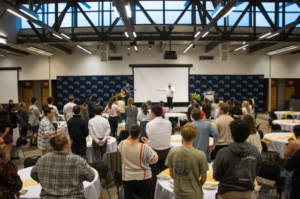For as Long as Our Love Shall Last

Photo Courtesy of The Institute of Human Ecology
By: Renee Rasmussen
Brad Wilcox, a sociology professor at the University of Virginia, recently visited Catholic University’s campus to discuss the idea of soulmates and the ways that it has played a part in the rising divorce rates.
In his talk, given on February 4, Wilcox introduced the “Soulmate Myth:” the idea that marriage is about an intense emotional connection that should last only as long as the relationship is fulfilling and makes the two people happy. Wilcox argues this idea that surfaced in the 1970’s is one of the main causes for the rapid rise in the divorce rates seen in the divorce revolution of that time period. Instead of a soulmate model for marriage, Wilcox raises the Family First Model, where marriage is based on certain goods such as children and economics. He argues this “us” mentality marriage is much more durable than the “me” mentality marriage the Soulmate Myth provides.
Held in Heritage Hall, this event was free and open to the public. There were about 50 people in attendance, many of whom were Catholic University students. The event lasted about an hour and was followed by a reception where the audience could get to know Wilcox and ask more questions.
Wilcox began his talk by referencing pop culture examples that contain the idea of a soulmate love. He quoted themes from Eat Pray Love, as well as “10,000 Hours” by Dan and Shay. His main point was that these popular books and songs represent the emotional, intense, adult love that society seems to be looking for in a marriage. They also represent the idea that love, and consequently marriage, should be self-fulling. If your marriage isn’t making you feel good, you should leave. This is most apparent in the example of Eat Pray Love where the main character leaves her first husband in search of a soulmate.
To sum up his thesis, Wilcox asks and answers three questions about soulmates: is it more fragile or unstable, is marriage today actually operating under the emotional individualistic adult centered model suggested by the soulmate model, and does the soulmate model deliver when it comes to forging the happiest marriages in America?
“Feelings are a fragile foundation for marriage,” Wilcox said to answer his first question. When the soulmate model was used for most marriages in the 1970’s, the beginning of the divorce revolution began, further proving the instability this model for marriage brings.
To prove the person-centered idea the soul mate model brings, Wilcox quoted “The Baltimore Wife” who, when talking about why she left her husband and kids, said that she believed she needed to live the one life she was given to do something for her. The Baltimore Wife wants what is best for her, not her family, and therefore leaves her marriage and children.
This further backs up the facts that prove that the soulmate model is unstable for successful marriages. When surveyed, married couples in California were seen to have much greater doubts about their marriage when they embraced the soulmate model.
To answer the second the second question Wilcox gave the audience a look into his daily life. He explained that the soulmate model might be used in marriages in the beginning, but once couples begin having kids and heavy bills, they realize there is more to marriage than feelings.
Wilcox for example described a normal night for him and his wife when he said, “There’s a mad dash to get dinner on the table, help kids with homework, deliver Simone to her tutor, clean the kitchen, super attend kids screaming, do nighttime prayers, pay the bills, and collapse in front of Netflix.”
Wilcox explained that the family first model is what keeps family stable, keeping the focus on the kids and helping the couple understand that marriage is not about themselves separately, but about themselves as a couple and a family.
Since 1980, divorce rates have decreased dramatically, only being around 37%, which Wilcox argues is mostly due to the family first approach to marriage.
Therefore, Wilcox answered his last question with no, the soul mate model does not deliver. The idea that a marriage centered on intense feelings and a belief that it should be good for you is unstable. While chemistry is important, a marriage centered around the family and the common good is more likely to be satisfying and last longer.








